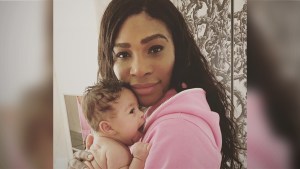You might notice a familiar face in the grocery store checkout line this month — Serena Williams is on the cover of Vogue with her 3-month-old daughter, Alexis Olympia Ohanian, Jr. The cover story is all about Williams’ new life as a mom and wife, including details about her return to tennis and a terrifying story about how she nearly died after giving birth.
But she wasn’t saved by a crack medical team of doctors and nurses — in fact, if things had been left in the hands of the medical staff, she would have died. She recognized sudden shortness of breath as a symptom of pulmonary embolism, so she found a nurse and told her exactly what she needed: a CT scan with contrast and IV heparin. Despite Williams’ history of blood clots, the nurse thought maybe the pain medication was making her confused.
Quartz magazine picked up the story, noting that near-death experiences in childbirth are horribly common for American women. What’s uncommon about Serena Williams’ story is that her medical knowledge and self-awareness gave her the tools she needed to convince the medical staff to save her life:
With a shockingly high maternal-mortality rate (several times the levels of other rich countries), Williams’s story will likely sound familiar to many women and all the more to black American women, who are three times more likely to die or suffer serious illness from pregnancy-related causes than white women, with at least 40 deaths per 100,000 live births on average, compared to 14 for white mothers.
Those statistics are horrible enough, but the ones that follow are even worse. According to the American College of Obstetrics and Gynecology, at least 46 percent of maternal deaths among African-American women and 33 percent of maternal deaths among white women could have been prevented.
I know that sounds bleak, but if Serena Williams’ story can teach us anything, it’s that when it comes to your body, you are your own best advocate. Doctors and nurses can monitor and run tests and check blood pressure, but they can’t feel what you’re feeling. They don’t know when something is wrong the way you know when something is wrong, and they might not always listen. But if you know that something isn’t right, tell them and be insistent.
Obviously, it helps to have a good relationships with a doctor you trust who knows you and trusts you in return. Doctors don’t always ignore complications — the doctor who saved my life when my son Isaac was born put together the clues from my previous four births in a way no other doctor had. She identified me as a hemorrhage risk when no one else did, and made sure the room I gave birth in was already stocked with multiple doses of emergency medications. She said it was probably overkill but “better safe than sorry,” and she was right. The nurses used every single syringe of medication in that room and then some.
But I was the one who alerted the nurses to the bleed in the first place. I felt my blood pressure drop and knew right away that I was hemorrhaging, and I told the nurse. She didn’t believe me at first, but because the doctor had alerted her to the risk, she double-checked by kneading my stomach. There was no doubt after that. Also after that, the nurses paid closer attention to how I said I was feeling and gave less attention to the monitors.
Getting doctors and nurses to take you seriously can be a tricky thing, but the best place to start is to be in touch with your body and aware of what’s going on. Take care of your body, educate yourself on any conditions you might have, find a doctor you can talk with for more than 15 minutes, and ask questions. If you have a symptom that’s worrisome, don’t ignore it and don’t panic (obviously unless it’s an emergency). But do ask your doctor, and follow up with any dietary or exercise changes he or she recommends.
Serena Williams’ story is frightening, but it’s also inspiring. You can be your own best advocate and you don’t have to be an internationally famous tennis start to do so. Just take your health seriously, and your health-care providers will, too.

Read more:
Serena Williams’ career decision makes an important statement about motherhood

